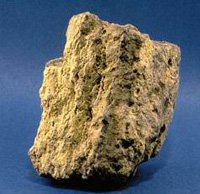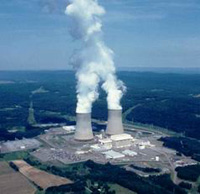Definition of Nuclear Energy
Nuclear energy is energy released from an atom’s nucleus when a small amount of mass is converted to energy during atomic fission or fusion according to the famous Einstein equation E=mc2 or energy equals mass times the speed of light squared.



All matter is composed of atoms. Inside the atom, the protons and neutrons of the nucleus are bound together by the nuclear force, a strong energy bond. Very large atoms like uranium are bound less tightly than smaller atoms like iron or krypton, so when uranium is split up in a reactor, the difference in energy is released and can make steam to drive a turbine. Once water is heated to steam the energy production process is the same as a coal, gas, or wood fired electricity generator.
How is nuclear energy obtained?
Nuclear energy can be released from the nucleus of an atom through fission, or splitting the atom’s nucleus. Nuclear energy can also be released through fusion, or combining atoms. However, the world’s scientists have not yet perfected a method for harnessing nuclear fusion or power generation. It is an area of current research.
What is nuclear energy used for?
In the U.S., nuclear energy is solely used for electricity generation. As of 2006, 19% of the electricity consumed by the U.S. came from nuclear energy. In France and Japan the majority of the electricity produced is from nuclear power plants.
